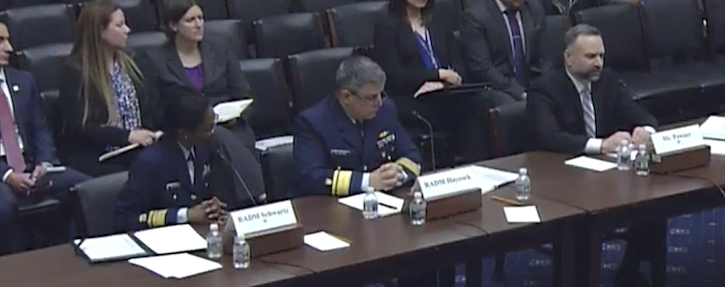Coast Guard Questioned on Its (Lack of) EHR Practices
In a congressional hearing, representatives from the military's smallest branch were grilled about EHR procurement failures.

More than 2 years ago, the United States Coast Guard (USCG) cancelled a planned contract with Epic Systems to implement an electronic health records (EHR) program. While most public and private health groups moved to EHRs years ago, the agency is still relying on paper records.
Today, government representatives wanted to know why.
“Let’s be clear: using paper is inefficient and dangerous,” David Powner, the IT Management Director of the Government Accountability Office (GAO), said in a hearing of the House Transportation and Infrastructure Committee. Botched contracts with software vendors aren’t uncommon, he said pointedly, but inactive leadership was at the root of the Epic failure.
The 2 figures representing USCG, Rear Admirals Michael J. Haycock and Erica Schwartz, both took responsibility for the current situation. RADM Haycock serves as the agency’s Assistant Commandant for Acquisition & Chief Acquisition Officer, while Schwartz has been its Chief Medical Officer since November 2015.
“Let me state up front: we sincerely regret what happened with the Integrated Health Information System,” Schwartz began, referring to previous efforts to modernize USCG’s health records that grew to include the since-cancelled deal with Epic. “We are incorporating lessons learned as we move forward with a new electronic health record.”
The 2 were not specific about a subsequent plan, but Schwartz noted that an EHR service acquisition was prioritized, while Haycock hinted that more details could come by the end of February. An exploratory request for information went out in April 2017.
Powner railed off a series of recommendations to improve the agency’s IT procurement when the time came. He pushed for USCG to actively involve executive leadership and knowledgeable IT experts in both procurement and implementation. His testimony and recommendations reflected the findings published in the GAO’s report on USCG EHR programs, released today to coincide with the committee meeting.
He also joined members of Congress in asking why the USCG wasn’t following the Department of Veterans’ Affairs (VA) and Department of Defense (DoD). Both agencies have recently announced deals with Cerner to implement its EHR technologies.
“Why would you not use DoD’s solution?” Rep. Duncan Hunter (R-CA) asked. “Why waste money and time to go look for things that exist already, right now?”
RADM Haycock indicated that Coast Guard was considering the possibility, but that more consideration needed to take place before such a major acquisition.
“Well, I would highly encourage you guys to do what’s easy and effective,” Hunter responded, saying that “piggybacking” on VA and DoD’s acquisition would be simple and could encourage better interoperability.
The committee at hand may consider a Cerner contract a no-brainer for those reasons, but there is little doubt that representatives from USCG are keeping a close eye on what’s happening with VA before they act. The agency announced a deal with Cerner more than 6 months ago, yet no contract has been finalized, and members of the agency have faced intense questioning at other congressional hearings about the projected costs and timelines of the plan.
Healthy Bottom Line: The Trouble With SDOH Programs and the Secret to Improving Them
September 28th 2021Several problems exist with current programs that address social determinants of health (SDOH); however, a new social model aims to combat these issues and improve the programs’ effectiveness.